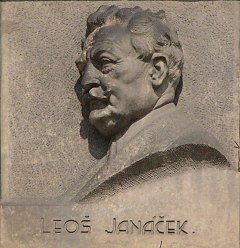The Makropulos Affair (opera)
| The Makropulos Affair | |
|---|---|
| Opera by Leoš Janáček | |

Relief of the composer by Julius Pelikán
|
|
| Native title | Věc Makropulos |
| Other title | The Makropoulos Case |
| Librettist | Janáček |
| Language | Czech |
| Based on |
Věc Makropulos by Karel Čapek |
| Premiere | 18 December 1926 National Theatre, Brno |
The Makropulos Affair (or The Makropoulos Case, The Makropulos Secret, or, literally, The Makropulos Thing; Czech Věc Makropulos) is a Czech opera in 3 acts, with music and libretto by Leoš Janáček. Janáček based his opera on the play Věc Makropulos by Karel Čapek. Composed between 1923 and 1925, The Makropulos Affair was his penultimate opera and, like much of his later work, was inspired by his infatuation with Kamila Stösslová, a married woman much younger than himself.
The opera received its world premiere at the National Theatre in Brno on 18 December 1926, conducted by František Neumann.
Janáček had seen the play early in its run in Prague on 10 December 1922, and immediately saw its potential as an opera. He entered into a correspondence with Čapek, who was accommodating towards the idea, although legal problems in securing the rights to the play delayed work. When these problems were cleared on 10 September 1923, Janáček began work on the opera. By December 1924, he had completed the first draft of the work. He spent another year refining the score, before completing it on 3 December 1925.
Musically, much of the piece has little in the way of thematic development, instead presenting the listener with a mass of different motifs and ideas. Janáček's writings indicate that this was a deliberate ploy to give musical embodiment to the disruptive, unsettling main character Emilia Marty/Elina Makropulos. Only at the end of the final act, when Makropulos' vulnerability is revealed, does the music tap into and develop the rich lyrical vein that has driven it throughout.
Janáček was making adjustments to the score almost right up to the premiere in Brno. Two years after its premiere, the opera was given in Prague, and also in Germany in 1929, but it did not become really popular until a production by the Sadler's Wells company in London in 1964, conducted by Charles Mackerras with Marie Collier as Emilia Marty. While performed with some regularity, it has not become part of the core opera repertory in the same way as have Jenůfa, Káťa Kabanová or The Cunning Little Vixen.
...
Wikipedia
